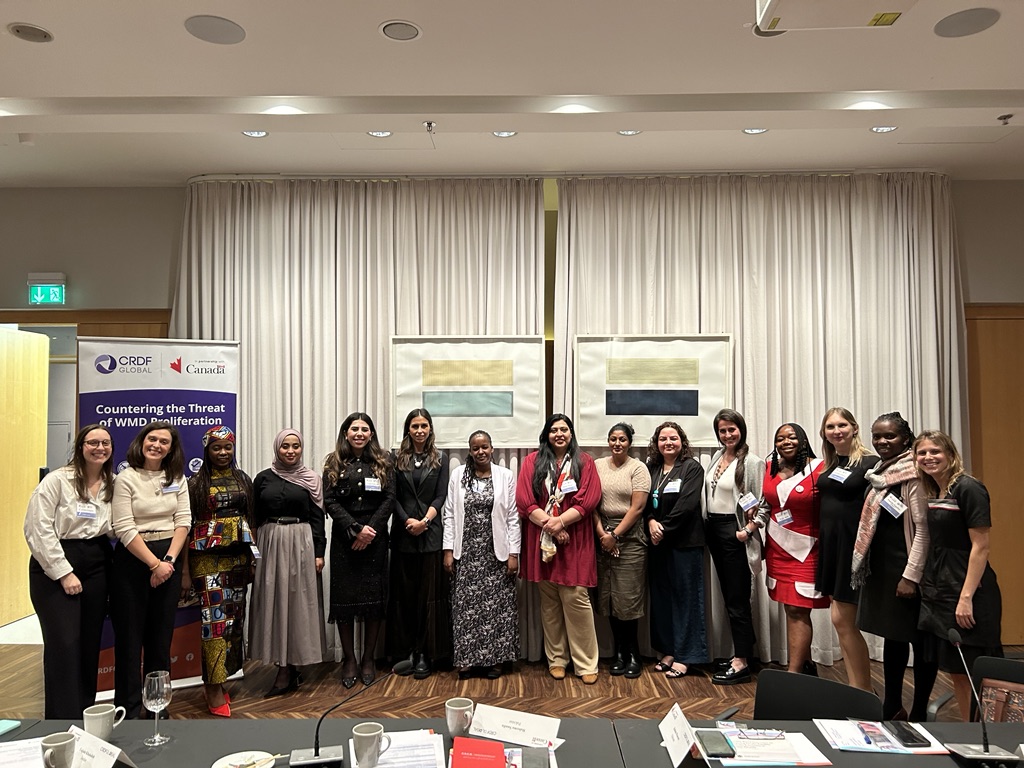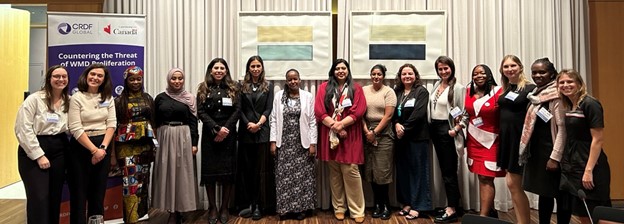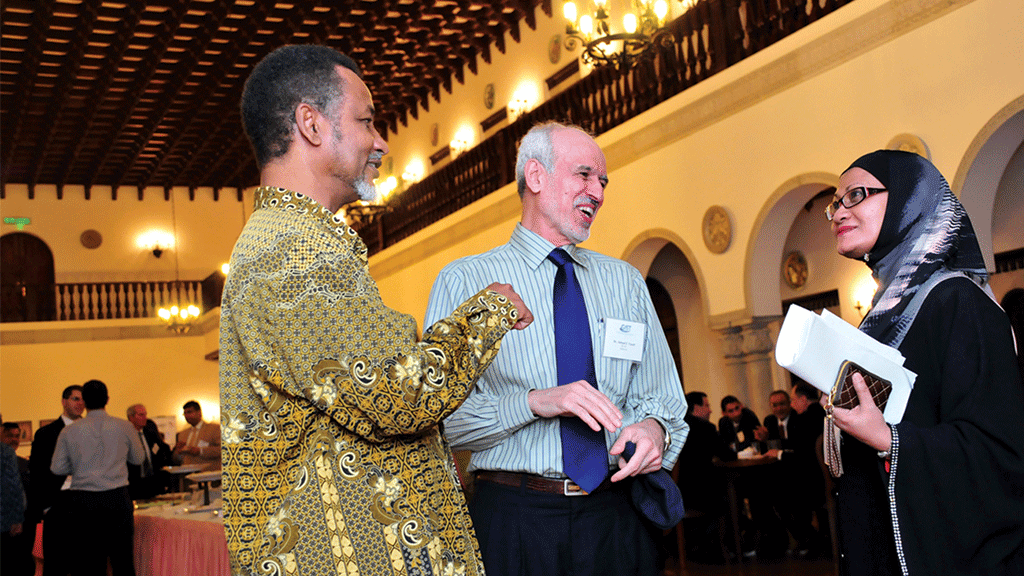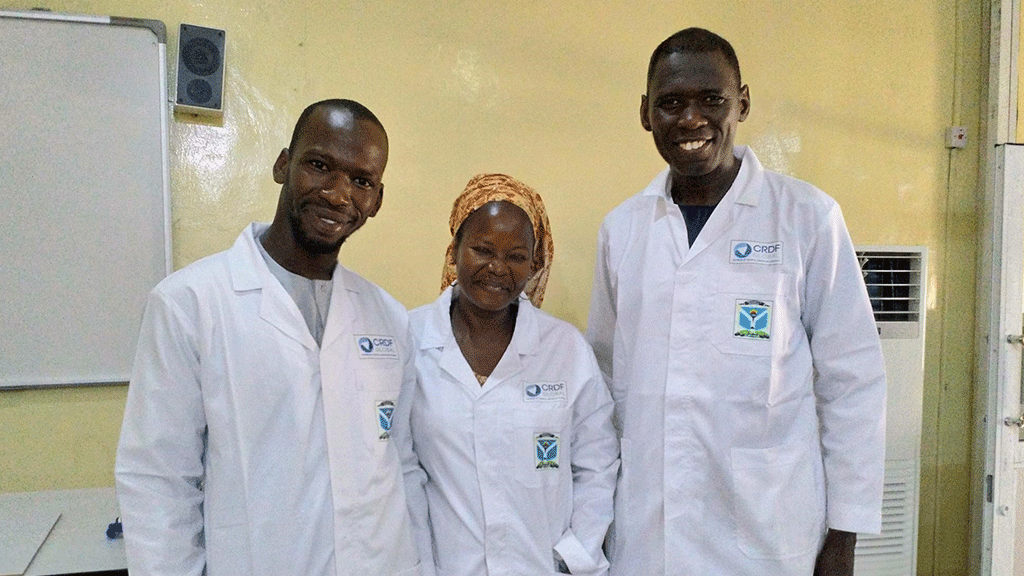Empowering Women in Nuclear Security: Capstone Presentations Mark the Successful Conclusion of an Impactful Fellowship

By Courtney Fatigato
On October 29-30, 2024, CRDF Global, with generous support from Global Affairs Canada (GAC), hosted the Capstone Workshop for the Building Networks Among Women in Nuclear Security and Nonproliferation Fellowship in Vienna, Austria. This two-day event marked the culmination of an impactful eight-month fellowship program designed to empower women in the nuclear security and nonproliferation sectors.
The event kicked off on October 29 with opening remarks from Sophia Brown and Courtney Fatigato of CRDF Global, who welcomed attendees and emphasized the significance of the fellowship’s accomplishments. Their remarks celebrated the work of the fellows, highlighting their efforts to engage women in remote areas, attract senior officials’ attention, and conduct vital interviews and surveys that addressed the unique challenges women face in the nuclear sector. They also expressed gratitude to GAC for its support and thanked the speakers and panelists for their contributions. The fellowship’s goals were further reinforced by Ms. Angela Veitch, Canada’s Deputy Permanent Representative to the International Organizations in Vienna, who discussed Canada’s Feminist International Assistance Policy and the importance of integrating gender equity into peace and security initiatives.

Left to right: Courtney Fatigato (CRDF Global), Leyla Amur (World Institute for Nuclear Security), Keziah Garba (Centre for Energy Research and Training), Hebah Eljuhani (Nuclear and Radiation Specialist), Lujain Khalaileh (Jordan Atomic Energy Commission), Camila Hernández Sánchez (Center for Non-Proliferation Studies), Josephine Wakuyu (Kenya Nuclear Regulatory Authority), Rubina Waseem (National University of Science and Technology), Helen Miriam Tony (Amity University), Haleema Saadia (The ROADS Initiative), Carolina Calvo (Center for Non-Proliferation Studies), Regina Alachi (Nuclear-Aware Africa), Anastasiia Fadeieva (CRDF Global), Pamella Kageliza Kilavi (Strathmore University), Sophia Brown (CRDF Global).
Capstone Presentations from the Fellows
The heart of the event was the fellows’ presentations, which reflected the diversity of their projects and the shared goal of advancing women’s participation in nuclear security and nonproliferation. Fellows from Chile, India, Jordan, Kenya, Nigeria, and Pakistan presented the outcomes of their mini-grant projects, each aimed at advancing women’s roles in the nuclear field. The presentations showcased the incredible efforts and innovative approaches of these women as they worked to create lasting change in their respective countries. Below are some of the highlights:
- Chile – Carolina Calvo & Camila Hernandez
The Chilean fellows worked to establish a Center for Non-Proliferation Studies in Chile, creating a network of 31 members across government and academia. Their research revealed a significant gender wage gap and underrepresentation of women in leadership roles in Chile’s nuclear sector. They are committed to expanding their network and addressing these disparities through continued collaboration.
- India – Helen Mariam Tony & Alpana Goel
The fellows from India focused on creating a collaborative network for women in the nuclear field. They documented the gender-specific challenges women face and published valuable insights, with over 20 interviews and 50 surveys completed. Their mentorship programs and awareness campaigns are set to continue empowering women in India’s nuclear sector.
- Jordan – Lujain Khaleilah & Hebah Eljuhani
The fellows from Jordan conducted a training course for 17 beneficiaries on women’s empowerment for nuclear security and nonproliferation. The course included lectures and a visit to the Jordan Research and Training Reactor. The fellows are now working on creating a national support network for women in the nuclear field.
- Kenya – Pamella Kilavi & Josephine Wakuyu
The Kenyan fellows trained 21 mid-level women managers in nuclear security and nonproliferation, uniting professionals across institutions to foster collaboration. They launched a Women in Nuclear Security Kenya chapter and are planning future events, including a small conference to continue building support and collaboration.
- Nigeria – Regina Alachi & Keziah Garba
The Nigerian fellows focused on mentorship through their Minerva Project, pairing 12 mentors with 24 mentees. Their initiative has had a profound impact, with participants reporting increased confidence in their roles. After learning about an opportunity at the World Institute for Nuclear Security (WINS) during the mentorship process, two mentees were awarded scholarships to the program to further their education in nuclear security.
- Pakistan – Rubina Waseem & Haleema Saadia
The Pakistani fellows identified and addressed the barriers hindering women’s involvement in nuclear discourse beyond Islamabad. Through a series of 20 online training sessions, an in-person workshop, and individual mentoring on participant research projects, they provided mentorship, knowledge, and guidance to 14 young women working in the field. This initiative has laid the foundation for the potential creation of a Women in Nuclear Pakistan network, aimed at empowering and supporting women in the nuclear sector.
Panel Discussion
Following the fellows’ presentations, a panel discussion brought together seasoned professionals in the field of nuclear security to share their experiences and insights. Panelists included Ms. Leyla Amur, Editor/Writer Consultant at WINS; Ms. Laura Rockwood, Senior Legal Advisor at the International Atomic Energy Agency (IAEA); Dr. Marcela Guzman, Senior Inspector at the IAEA; and Ms. Oum Keltoum Hakam, Education Officer at the IAEA.
Each panelist shared their unique career journey, reflecting on the challenges and triumphs that have shaped their roles in nuclear science and diplomacy. They also discussed the importance of mentorship and the increasing representation of women in the nuclear field. This was an invaluable opportunity for the fellows to learn from their experiences and ask questions about career development, work-life balance, and overcoming gender biases.
Hands-On Learning and Networking
On the second day of the workshop, fellows participated in a hands-on experience at the IAEA’s Nuclear Laboratories at Seibersdorf, Austria. They toured the newly established Nuclear Security Training and Demonstration Centre and learned about the work of IAEA safeguards inspectors. The session was both educational and inspiring, offering fellows a deeper understanding of the technical and analytical aspects of nuclear security.
The day concluded with a networking reception at the Vienna International Center, where fellows connected with professionals from the IAEA, Marie Skłodowska-Curie and Lise Meitner Fellows, and other representatives in the nuclear security field. Ambassador Troy Lulashnyk, Canada’s Ambassador to Austria and Permanent Representative to the International Organizations in Vienna, welcomed the group and expressed his enthusiasm for the great work done by the fellows. This event not only allowed for valuable professional connections but also provided an opportunity to reflect on the fellowship’s success.
Action Planning for Future Fellowships
The fellowship’s final session involved an action planning workshop, during which fellows and CRDF Global staff shared feedback on the program’s strengths and areas for improvement. Fellows discussed their experiences with the application process, project management, and the challenges they faced during their fellowship. Their feedback will help shape future iterations of the program, ensuring that it continues to evolve and support the next generation of women leaders in nuclear security.
Closing Reflections
In her closing remarks, Chilean fellow Camila Hernández expressed the transformative nature of the fellowship: “This has been an incredible experience working with all of you over the past six months. These projects have already made a significant impact and will continue to enrich the lives of many women in our communities. I came into this believing that there were no barriers, but I’ve come to realize that they do exist. However, these past few days in Vienna have convinced me that our potential to create change is limitless.”
This sentiment was echoed by Pakistani fellow Rubina Waseem, who added, “These initial projects will give rise to a number of complementary initiatives in our respective countries, which is one of the most beautiful aspects of this model. It was wonderful to meet everyone and learn from your experiences.”
As the fellowship concluded, it was clear that these women are not only breaking down barriers in the nuclear security field but are also paving the way for future generations of women to thrive in this vital sector.
Looking Forward
The Building Networks Among Women in Nuclear Security and Nonproliferation Fellowship is a testament to the power of collaboration and mentorship in creating lasting change. As the fellows return to their respective countries, their projects and networks will continue to drive progress in nuclear security and nonproliferation, empowering more women to take on leadership roles in this critical field.
With the support of organizations like CRDF Global and Global Affairs Canada, the future is bright for women in nuclear security—and the fellowship’s impact will continue to grow, one project, one mentor, and one empowered woman at a time.



